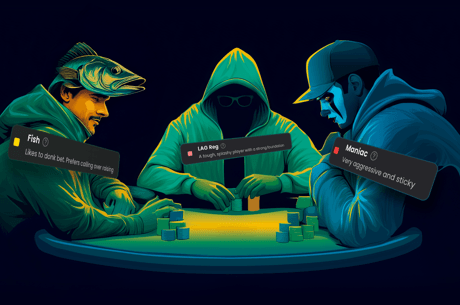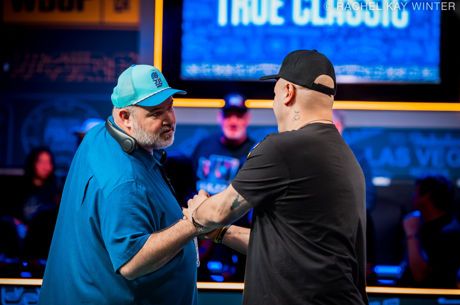How Your Superstitious Beliefs Are Costing You Money

The other day I was browsing through the beautiful photos posted online from the ESPN magazine “Body Issue,” when I came across this quotation from Tyler Seguin, who plays hockey for the Dallas Stars:
I’m anti-superstitious. If I tape my stick one way and then go out and get a hat trick, the next game I’m going to tape my stick a different way. I always want to tell myself, ‘It’s not because of that’ — I can change everything and leave it all on me. The superstitious guys on the team think I’m a weird bird.
I know nothing about hockey, but boy howdy, I sure like the way this guy thinks. I wish I could persuade poker players to adopt a similar mindset. But that task would be gargantuan. Superstition is pervasive among poker players.
Let me share a few examples I’ve collected over the years, and then tell you why I’m convinced that such thinking is hazardous to your bankroll.
In 2007, Frank Rusnak finished sixth in the World Poker Tour Caribbean Poker Adventure. During the broadcast of that final table, he said:
I don’t really consider myself superstitious, but every day that I’ve been here I’ve done the same exact routine, even, like, the way that I walk through the casino. I like to step on certain things, because I don’t want to jinx anything. I’ve tried not to change a single thing.
One wonders how a man who studiously retraces his steps through the casino because he doesn’t want to “jinx anything” manages to think of himself as not superstitious.
In the short-lived TV show Cash Poker, Kristy Gazes was serving as commentator. At one point, Todd Brunson removed his baseball cap just before betting. Gazes said:
That’s a nice bet, and he took off his hat. I don’t know if I like that, superstitious-wise. He took it off in the middle of a hand. That might go against him this hand. I’m just saying for all you luck fiends out there like myself.
Yes, it might “go against him this hand.” Or it might go for him this hand. Or it might go against him 17 hands from now. Or it might go for him a year later. Since superstitions are only figments of your imagination, you’re free to imagine them to have any effect you care to see.
A friend of mine once wrote in an online poker forum:
I always shuffle my [hole] cards 6 times before I look at them, if I don't shuffle them I will lose with them, I know shuffling makes no difference, but it's tradition.
It seems that he struggles with superstition. He knows rationally that his shuffling the two cards “makes no difference,” but still he can’t escape the fear that failing to do so will cause him to lose. This is an illustration of why it’s good to rip superstitious thoughts out of your mind as soon as they appear. If left to take root, it can be much harder to free yourself of their grip later.
During the broadcast of the 2007 NBC National Heads-Up Poker Championship, Gavin Smith said this:
When I first moved out here and started playing tournament poker at the World Series 2004, I had my hair kind of long, and I did really well at the World Series. Well, after that the girl I was seeing at the time got me to cut my hair, and I ran really bad for the next, like, three months, didn’t really do anything. So I decided that my hair was lucky, and I have not cut it since October 2004.
Fortunately, he has since then relented on that commitment. Or maybe somebody has been cutting his hair while he sleeps, like Samson of old.
Are these beliefs just harmless bits of fun? I think not. I think they do real damage, because they prevent you from getting to the real reasons why you’re winning or losing at poker.
If Rusnak allows himself to believe that he has gone deep in a big-money tournament because he happened to discover a lucky route to take from his hotel room, there’s no need to think hard about what he has been doing in the game that has made him successful. Perhaps he has stepped up his aggression in a favorable way, but won’t be able to recognize how that has benefitted him because he’s concentrating on what he has to do to avoid putting a “jinx” on his luck.
If Gazes is a “luck fiend” when she plays poker, obsessed with searching for causal connections between the outcome of a poker hand and the unrelated things that happened before — such as removing a hat — it’s hard to see how there is mental energy left for studying the information that is actually pertinent to understanding how opponents think and play, such as betting patterns.
When my friend carefully counts the number of times he shuffles his down cards, worried that he will cause himself to lose if he gets it wrong, he’s missing out on whatever tells his opponents may be exhibiting.
If Smith believes that he’s running bad for months at a time because of a haircut, then there’s no room for critically examining his play to see whether he has been making bad decisions that are the real cause for his losses.
For all of my years in poker, I’ve used the same silver dollar as a card protector. I am not the least bit superstitious about it. I simply like it. It’s functional, easy to carry around, and aesthetically pleasing. But nearly every time I bring it out, some other player will ask, “Is that your lucky coin?”
I used to tell the truth and answer, “No, I just like it.” But in recent years I’ve taken to lying and saying “yes.” I want them to believe that I am lucky, because many poker players fear a player who they think is lucky more than one who is skillful. More generally, I want my opponents to think superstitiously, because it hinders them from thinking critically and rationally about the game, which might make them better players.
For my readers, however, I want better. I want you to cleanse your thoughts of the insidious and false conclusion that some specific “lucky” or “unlucky” event or thing that you did caused a particular poker outcome. I want you to realize, along with Tyler Seguin, “It’s not because of that — I can change everything.”
Robert Woolley lives in Asheville, NC. He spent several years in Las Vegas and chronicled his life in poker on the “Poker Grump” blog.
Want to stay atop all the latest in the poker world? If so, make sure to get PokerNews updates on your social media outlets. Follow us on Twitter and find us on both Facebook and Google+!










